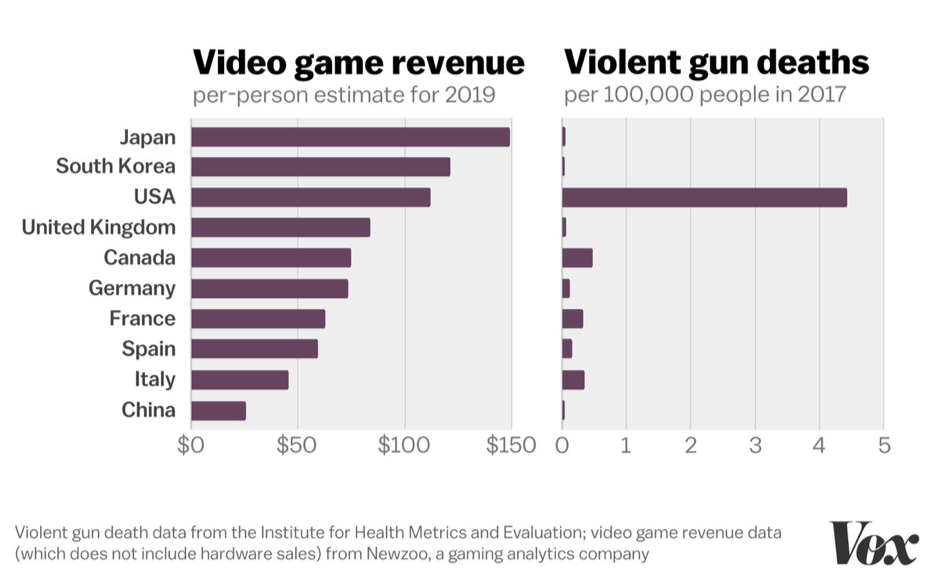When I was nine, I was lucky enough to borrow Grand Theft Auto: III from an extended cousin without my usually eagle-eyed mother noticing the dreaded 18 on the front of the box. Within the hour I had parked my car on the head of a local ‘businessman’ who’d had the temerity to pimp his hoes on my block and, having used the last of my Uzi rounds in a drive-by on an ice cream van, murdered his associates in broad daylight with a baseball bat.
It’s understandable that parents of a nine-year-old might find this a bit much.

If my mother had been aware of the two teenagers in Tennessee who killed a man that year, firing rifles at passing traffic “just like in Grand Theft Auto,” video games would inevitably have led to violence: I’d have gotten a clip round the ear for having the cheek to sneak it into her house.
Like most of my male peers, I revelled in video games as a child, and many of the industry’s best games have focused on violence. Fortunately, just like the overwhelming majority of those who play video games, I could completely disassociate virtual reality from the real world, which seems an alien concept at present for both middle-aged aunties and American politicians.
By the time I had picked up GTA I’d already landed on the D-Day beaches in Medal of Honour: Frontline, spent most of my summer that year capturing North Korean war criminals in Mercenaries, and had guided an SAS unit out of combat theatres in Afghanistan, Colombia, and the Philippines in Conflict: Global Storm. I was battle-hardened.
In all that time, I don’t remember enacting any violence more egregious than a kick in the shins. Video games didn’t make me aggressive, stop me spending hours at the park or doing well in school, or introduce me to sins I didn’t yet understand. I wouldn’t discover what a pimp (or a hoe) was for years.
There’s an overwhelming number of peer-reviewed scientific studies that suggest this is the norm. The Universities of Oxford and York offer recent newsworthy examples. So hopefully there shouldn’t be too much argument, right?
Wrong. Just like video nasties, or Dungeons and Dragons, or pop and rock music, or comic books, violent video games are being tarred with a brush that doesn’t apply to them.
The grim tragedies in Ohio and Texas have dragged video games back into the limelight as a potential catalyst for serious violence. Donald Trump claims that “the level of violence in video games is really shaping young people’s thoughts.” House Minority Leader Kevin McCarthy has “always felt that is a problem for future generations and others… what it does to individuals”; Kentucky’s governor, Matt Bevin, lambasts the games “that celebrate the slaughtering of people.”
These attacks completely fail to explain why gun crime in the United States is far higher than the countries that sell similar numbers of video games. Rather than investigate the role of gun laws in gun crime, video games are a distraction from the difficult questions that many in the country do not want to be answered. The statistics speak for themselves. Spot the country with the most liberal gun laws:

These attacks tend to ignore both statistical and legal precedents in favour of a compelling narrative, because they’d fall flat if they had to rely on facts. The country’s Supreme Court has ruled that there’s no clear correlation between violent video games and aggressive behaviour. The only major study linking violence to video games, from the American Psychological Association, has been refuted in an open letter from 230 academics and accused of “misrepresent[ing] the actual research and misinform[ing] the public.”
According to Chris Ferguson, a psychology professor at Stetson University, “the data on bananas causing suicide is about as conclusive. Literally. The numbers work out about the same.” Trump’s relationship with the truth is accidental at best, but the science here is clear; we cannot link the two.
Mistakenly associating bad behaviour, mental illness or ‘sin’ with a medium of entertainment has been done to death. I’d challenge you to think of an example where the accusers were proven right.
This is a debate where the science is as clear as it can be, with legal bodies and a plethora of researchers coming to the same conclusion. It’s a dead conversation being used by people who ignore the evidence to distract from the truth: that banning video games is not going to stop the next high school massacre.

